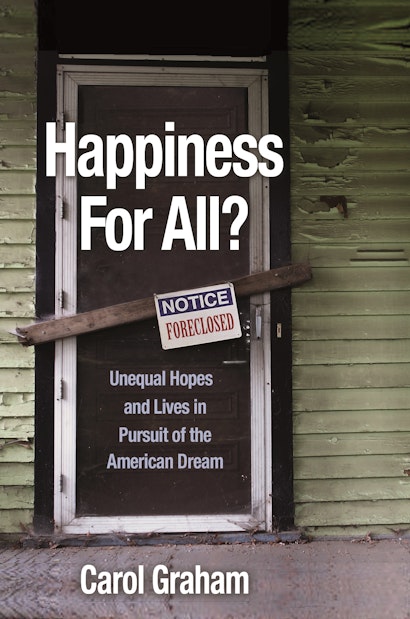The Declaration of Independence states that all people are endowed with certain unalienable rights, and that among these is the pursuit of happiness. But is happiness available equally to everyone in America today? How about elsewhere in the world? Carol Graham draws on cutting-edge research linking income inequality with well-being to show how the widening prosperity gap has led to rising inequality in people’s beliefs, hopes, and aspirations.
For the United States and other developed countries, the high costs of being poor are most evident not in material deprivation but rather in stress, insecurity, and lack of hope. The result is an optimism gap between rich and poor that, if left unchecked, could lead to an increasingly divided society. Graham reveals how people who do not believe in their own futures are unlikely to invest in them, and how the consequences can range from job instability and poor education to greater mortality rates, failed marriages, and higher rates of incarceration. She describes how the optimism gap is reflected in the very words people use—the wealthy use words that reflect knowledge acquisition and healthy behaviors, while the words of the poor reflect desperation, short-term outlooks, and patchwork solutions. She also explains why the least optimistic people in America are poor whites, not poor blacks or Hispanics.
Happiness for All? highlights the importance of well-being measures in identifying and monitoring trends in life satisfaction and optimism—and misery and despair—and demonstrates how hope and happiness can lead to improved economic outcomes.
Awards and Recognition
- One of Project Syndicate’s Best Reads in 2017 (chosen by Kermal Dervi )
"Carol Graham . . . makes a convincing case that perceptions of well-being, including factors like stress and a sense of the value of one's life, have become far more negative for poorer Americans since 2007."—Jeff Madrick, The New York Review of Books
"A persuasive and well-supported study. Highly recommended."—Karen Shook, Times Higher Education
"Graham is one of the few scholars who have traced the effects of a dramatic increase in inequality between the rich and poor in America."—Ana Swanson, WashingtonPost.com's Wonkblog
"Graham pushes the wellbeing date into a more fruitful area, to assess how the experience of inequality shapes the views Americans hold about the future and the value of hard work. . . . She pierces the myth that inequality is accepted in the US because it is accompanied by so many success stories."—Geoff Dyer, Financial Times
"[Carol Graham’s] important new book is the empirical version of Hillbilly Elegy."—Peter R. Orszag, Bloomberg View
"The principle merit of Graham’s work is in this demonstration that wellbeing theory and metrics, even in their present infancy, have a lot to contribute to economics and economic policy and deserve to be taken more seriously."—Mark Fabian, Economic Record
"With Happiness for All?, Carol Graham takes the study of the new inequality one step deeper. She tells what it means from the perspective of those who suffer from it, as she explores, from many different angles, how it affects Americans' sense of well-being, and their place within the American dream. This is a very important book, on the deepest social problem facing the United States today."—George Akerlof, Nobel Laureate in Economics
"Compelling. Happiness for All? is a significant work of scholarship by one of today's leading scholars in the field. Graham's book will inform our debates on inequality, and is extremely timely and important."—Martin Binder, Bard College Berlin
"Carol Graham uses well-being measures to bring new insights to the divisions that are threatening America. Far from dreaming of a better tomorrow, many Americans, especially white Americans, are deeply pessimistic about their future and the futures of their children. This book brings much to think and to worry about."—Angus Deaton, Nobel Laureate in Economics
"In a world where people are turning against governments from across the political spectrum, the search is on to discover the source of this collective angst. Why are the leaders of extremist political parties gaining so much support and why did the UK vote to leave the EU? In this timely and invaluable book, Carol Graham investigates whether inequalities in well-being can explain this profound sense of alienation. We know globalization created many losers but, until now, these effects were measured in terms of income not individuals' well-being. The well-being lens casts a powerful light on the fundamental causes: lack of opportunity caused by poor education and failure to invest in the skills needed in the future."—(Lord) Gus O'Donnell, chairman of Frontier Economics and president of the Institute for Fiscal Studies
"Graham writes with clarity and passion."—Andrew Oswald, University of Warwick


